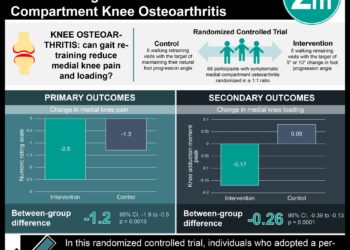Effectiveness and user experiences of a valgus brace in patients with knee osteoarthritis: A mixed-method randomised controlled trial
1. After six months, valgus brace users reported a statistically significant and clinically meaningful reduction in knee pain after walking and required fewer pain medications
Evidence Rating Level: 1 (Excellent)
This mixed-method randomized controlled trial evaluated the effectiveness and user experiences of a valgus brace in patients with medial compartment knee osteoarthritis. Fifty-five participants aged 40–75 with radiographically confirmed OA were randomized to either receive regular care plus a custom-fitted valgus brace or to a waitlist control for six months. The primary outcome was knee pain intensity measured on a 10-cm visual analogue scale (VAS) at six months, with secondary outcomes including walking distance, health status (SF-12), function (WOMAC), and satisfaction. Quantitative analysis showed no significant differences in pain at rest, physical function, or health status, but brace users experienced a clinically meaningful reduction in pain intensity after a six-minute walk test (mean difference 2.13 cm on VAS, 95% CI −3.57 to −0.69) and required fewer analgesics. Qualitative interviews with a subset of brace users revealed mixed but often positive perceptions, with improvements reported in pain, stability, mobility, and daily activities, though some users described discomfort, skin irritation, or limited benefit, particularly among those with more advanced OA. Overall, while underpowered, the study supports that valgus braces can reduce walking-related knee pain and enhance user-perceived function, though effectiveness may vary with disease severity, underscoring the need for larger, longer-term studies.
Click here to read the study in PLOS One
Image: PD
©2024 2 Minute Medicine, Inc. All rights reserved. No works may be reproduced without expressed written consent from 2 Minute Medicine, Inc. Inquire about licensing here. No article should be construed as medical advice and is not intended as such by the authors or by 2 Minute Medicine, Inc.









